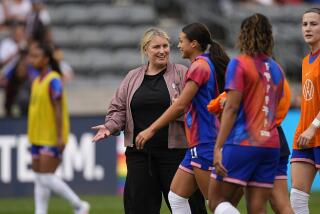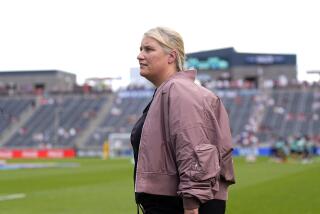A pipeline runs through North Carolina
- Share via
He is the winningest coach in NCAA women’s soccer, but North Carolina’s Anson Dorrance also has helped supply the sport’s coaching ranks with his former players.
“Part of our philosophy at N.C. is to empower the women we’re coaching,” Dorrance said.
“And part of that empowerment is, we’re trying to sell them on considering this as a potential profession. We don’t really push them.”
Dorrance, whose Tar Heels last season brought home their 18th NCAA championship, walks the walk.
Now in his 29th season as North Carolina’s coach, he has long promoted women to fill coaching vacancies.
When Dorrance became U.S. national team coach in 1986, he selected Lauren Gregg as his top assistant.
Gregg, a former All-American at North Carolina, was captain of the 1982 NCAA championship squad, the program’s first. Other Tar Heels who followed in Dorrance’s footsteps include former U.S. national team coach April Heinrichs, Illinois Coach Janet Rayfield, Ohio State Coach Lori Walker and Tennessee Coach Angela Kelly.
“We see which ones end up jumping in with us in the summer soccer camps,” Dorrance said of his players. “Obviously, those are the ones who seem to have a passion for the game and a passion for coaching. . . .
“We have player conferences with these kids three times a year. And right after we talk about academics, we also talk about career. We basically ask them what they want to do post-graduation. A lot of them mention coaching, and when that happens, I let them know if they ever need help coaching anywhere, I’d love to recommend them.
“I really feel like it’s the current level of women playing at an elite level that will eventually be superior coaches on the women’s side,” Dorrance said. “So that’s an easy recommendation for me to make.”
Dorrance, 56, coached both men and women at North Carolina before choosing to lead the women’s team exclusively. He is not alone in moving from a men’s team and, at least for Dorrance, the reasons are not complex.
“I really felt like it was an opportunity for me to have some chances to do some elite-level coaching I never would have been extended on the men’s side,” he said. “And it was also an opportunity to pioneer a sport, so that was a motivation.
“The other motivation is women, frankly, are more coachable. A lot of times when you’re coaching men, it’s basically a fight to get them to do what you think is best for them and for the team. The other thing I appreciated about the women is they actually appreciated you.”


